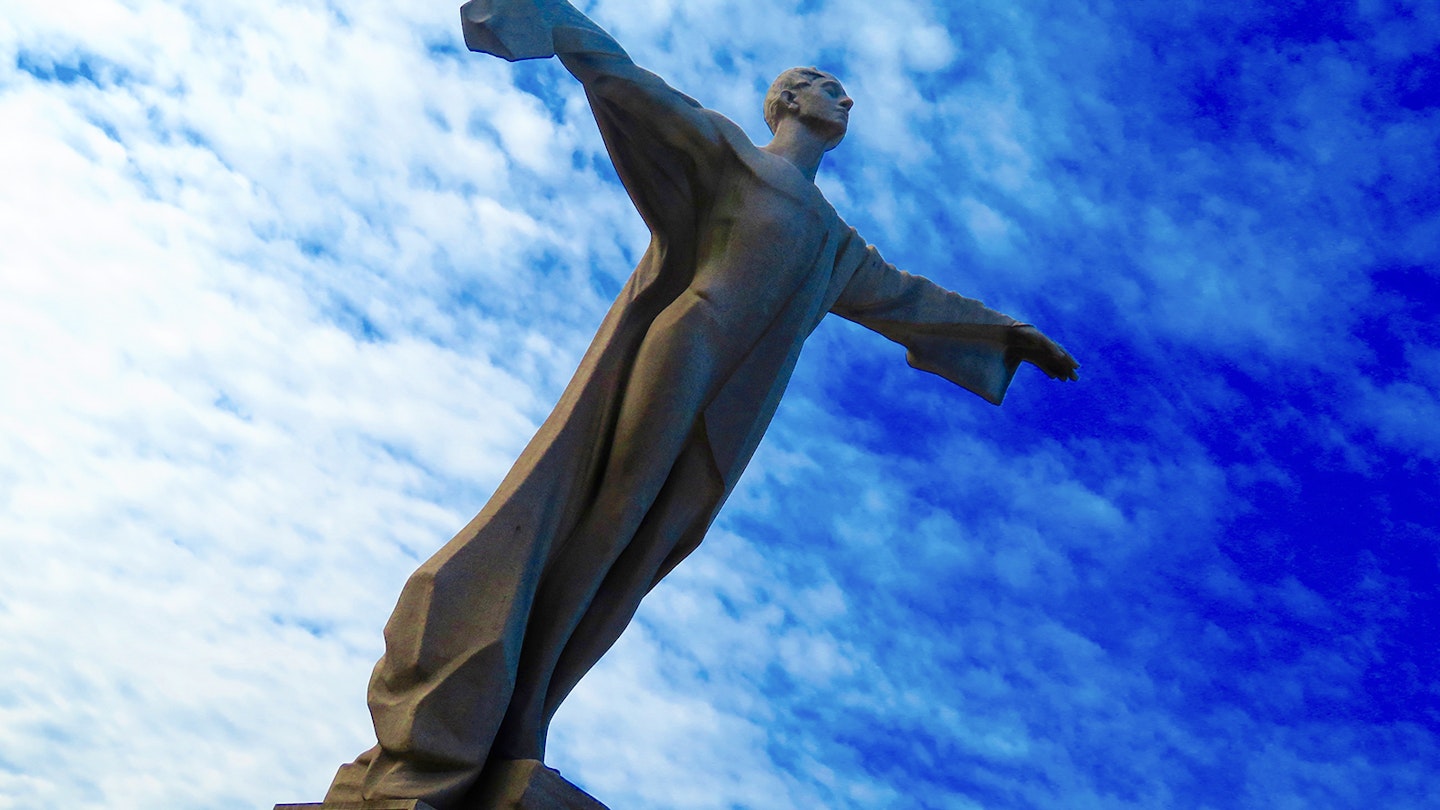Discover Washington DC’s Unique Statues
Washington, DC is best known for its monuments celebrating the nation’s founders and historical figures, particularly the grand marble memorials along the National Mall. However, beneath the surface, there are numerous intriguing statues scattered throughout the capital that are much more unexpected than you might think.
Women’s Titanic Memorial
Where: Washington Channel Park, Fourth and P Sts SW
The outstretched arms of this red granite figure appear to mimic Rose’s from the film Titanic, yet this statue at Fort McNair’s northernmost tip, overlooking the Washington Channel, was unveiled well before the blockbuster hit the silver screen. Designed by socialite Gertrude Vanderbilt Whitney and dedicated in 1931, it honors the brave men who perished in the wreck of the Titanic on April 15, 1912, stating they gave their lives for the survival of women and children. Every April 15, formally dressed members of the Women’s Titanic Society gather here to sip champagne and lay a wreath in memory of those lost that fateful night.
Adams Memorial
Where: Section E, Lot 202, Rock Creek Cemetery, Petworth
This shrouded bronze figure, known as ‘Grief,’ encapsulates the complex emotions surrounding death — a blend of sorrow and tranquility. Commissioned by novelist Henry James in 1886 to memorialize his photographer wife, Clover Adams, who tragically committed suicide, the sculpture draws from James’s experiences in Japan, reflecting a unique philosophy from the Gilded Age.
Emancipation Memorial
Where: Lincoln Park, Capitol Hill
The Emancipation Memorial, one of the early tributes to Abraham Lincoln, provokes considerable discussion due to its portrayal of former slaves. Sculpted by Thomas Ball and dedicated in 1876, it features Lincoln holding the Emancipation Proclamation and overseeing a formerly enslaved man. While the statue was funded by former slaves, its representation hints at the prevailing attitudes of the era, prompting critiques regarding its interpretation today.
Albert Einstein Memorial
Where: National Academy of Science, on Constitution Avenue, NW
The larger-than-life bronze statue of a relaxed, seated Einstein is a favorite among both children and adults in DC. Dedicated in 1978, this memorial features Einstein holding a bronze paper documenting his significant contributions to science, while a star map below enhances the experience, making it an entertaining photo opportunity for visitors.
Rabboni
Where: Section B, Lot 164, Rock Creek Cemetery, Petworth
In one of the city’s more surprising installations, a bronze representation of Mary Magdalene reaches toward the risen Jesus Christ on Easter morning. Created by Gutzon Borglum, this striking memorial reflects deep emotions with its dark patina and poignant expression, honoring the family of a prominent DC banker.
Full Count
Where: Federal Reserve Bank courtyard, 20th and Virginia Ave NW
In downtown DC, this lively baseball-themed statue captures a moment in the game with precision. Created by sculptor John Dreyfuss, the statues of a pitcher, batter, catcher, and umpire reflect America’s cultural pastime and its ability to serve as a lens for societal issues.
Olive Risley Seward
Where: Just off Seward Park, 6th St and North Carolina Ave SW, Capitol Hill
This statue of Seward’s adopted daughter stands out in her front yard, crafted by sculptor John Cavanaugh in 1971. The eerie expression and dark lines on her face evoke curiosity and intrigue, making it a captivating piece amid the quiet surroundings of Seward Square.
A. Philip Randolph
Where: Union Station
Situated at Union Station, this bronze statue of A. Philip Randolph reflects his legacy as a crucial labor leader and civil rights figure. Sculpted by Ed Dwight in 1990, it pays homage to Randolph’s contributions, including his role in organizing the historic 1963 March on Washington.
Kahlil Gibran Memorial Garden
Where: Massachusetts Ave NW
This memorial garden celebrates Kahlil Gibran, the Lebanese poet, and philosopher, featuring a unique design by Gordon Kray on the 100th anniversary of Gibran’s birth. The floating bronze head amidst a stone wall and fountain serves as a reminder of Gibran’s influence, while also being conveniently located near significant places of worship.




